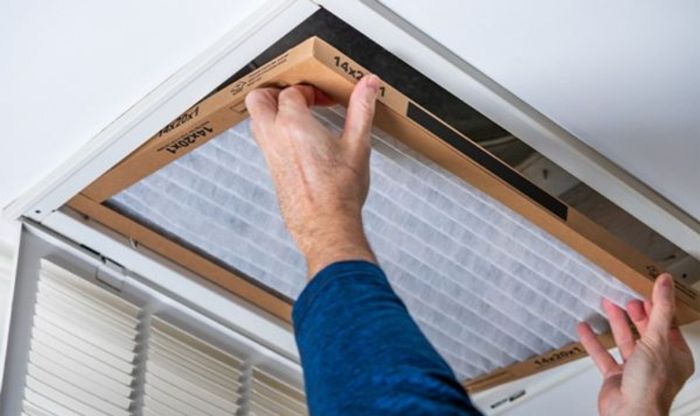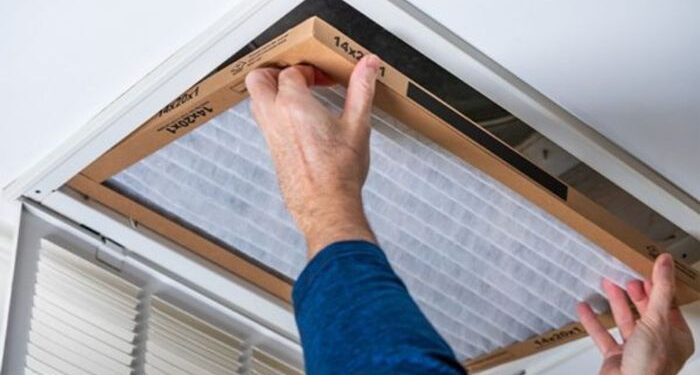Delving into the realm of AC Filters and Indoor Air Quality Explained, this guide aims to shed light on the crucial role these filters play in ensuring clean and healthy indoor air. Get ready to uncover the mysteries behind different filter types and their impact on air quality!
Importance of AC Filters
AC filters play a crucial role in maintaining indoor air quality by trapping airborne particles that can cause health issues.
Types of AC Filters
- Fiberglass Filters: These are the most basic type of AC filters and are effective in capturing large particles but may not be as efficient in removing smaller particles.
- Pleated Filters: These filters have a larger surface area and are more effective in trapping smaller particles like dust, pollen, and pet dander.
- High-Efficiency Particulate Air (HEPA) Filters: Considered the most effective, HEPA filters can capture up to 99.97% of particles as small as 0.3 microns.
Types of AC Filters
When it comes to AC filters, there are various types available in the market to choose from. Each type has its own set of features and benefits that cater to different needs and preferences.
Fiberglass Filters
Fiberglass filters are the most common and budget-friendly option. They are disposable and work by capturing large particles like dust and lint. However, they are not as effective in trapping smaller particles and need to be replaced more frequently.
Pleated Filters
Pleated filters are more efficient than fiberglass filters as they have a larger surface area for trapping particles. They are available in various MERV (Minimum Efficiency Reporting Value) ratings, which indicate their effectiveness in removing different sizes of particles from the air.
HEPA Filters
HEPA (High-Efficiency Particulate Air) filters are the most effective at removing airborne particles, including dust, pollen, mold spores, and pet dander. They are recommended for those with allergies or respiratory conditions. However, HEPA filters are more expensive than other types.
Reusable vs. Disposable Filters
Reusable filters are typically made of washable materials like aluminum or plastic. While they can be cleaned and reused multiple times, they are less effective in trapping particles compared to disposable filters. Disposable filters, on the other hand, are convenient and easy to replace but need to be changed regularly to maintain optimal performance.
Importance of Regular Replacement
Regularly replacing AC filters is crucial for maintaining good indoor air quality and ensuring the efficient operation of your HVAC system. Clogged or dirty filters can restrict airflow, leading to reduced efficiency, increased energy consumption, and potential damage to the system.
It is recommended to check and replace filters every 1-3 months, depending on the type of filter and environmental factors.
Factors Affecting Indoor Air Quality

Indoor air quality can be affected by various factors that can have a significant impact on our health and well-being. Common factors include dust, pet dander, mold, volatile organic compounds (VOCs), tobacco smoke, and pollen.
Dust
Dust particles in the air can consist of a variety of substances, including dead skin cells, pollen, and fibers from clothing and furniture. Inhaling dust can trigger allergies and respiratory issues, especially in individuals with asthma.
Pet Dander
Pet dander is tiny flecks of skin shed by animals with fur or feathers. It can linger in the air and on surfaces, leading to allergic reactions in susceptible individuals. Regular grooming of pets and vacuuming can help reduce pet dander in the home.
Mold
Mold thrives in moist environments and can release spores into the air, causing respiratory problems and allergic reactions. Proper ventilation, dehumidification, and prompt repair of water leaks can help prevent mold growth.
Impact on Health and Well-being
Poor indoor air quality can lead to a range of health issues, including allergies, asthma, respiratory infections, and even more severe conditions like lung cancer. Long-term exposure to indoor air pollutants can have a cumulative effect on our health
Tips to Improve Indoor Air Quality
- Increase ventilation by opening windows and using exhaust fans.
- Keep indoor humidity levels between 30-50% to prevent mold growth.
- Use air purifiers with HEPA filters to remove pollutants from the air.
- Avoid smoking indoors and minimize the use of harsh cleaning chemicals.
- Regularly clean and replace AC filters to trap dust and other particles.
Maintenance and Care of AC Filters
Regular maintenance and care of AC filters are crucial to ensure the efficiency and effectiveness of your air conditioning system. Neglecting to clean or replace filters can lead to poor air quality, reduced airflow, and increased energy consumption.
How to Clean Reusable AC Filters
Reusable AC filters need to be cleaned regularly to maintain optimal performance. Follow these steps to clean your reusable AC filters:
- Turn off the power to your HVAC system to prevent any accidents.
- Locate the filter in your air conditioning unit.
- Remove the filter carefully and gently vacuum off any large debris.
- Rinse the filter with water to remove dirt and dust particles.
- Allow the filter to dry completely before reinstalling it back into the unit.
- Turn the power back on and enjoy improved air quality with a clean filter.
Importance of Regular Maintenance and Replacement of AC Filters
Regular maintenance and replacement of AC filters are essential for several reasons:
- Improved air quality: Clean filters help trap dust, pollen, and other airborne particles, improving indoor air quality.
- Energy efficiency: A dirty filter can restrict airflow, making your HVAC system work harder and consume more energy.
- Extended lifespan of the HVAC system: Regular maintenance can prolong the life of your air conditioning unit by reducing strain on the system.
Tips on Extending the Lifespan of AC Filters
Follow these tips to extend the lifespan of your AC filters and ensure optimal performance:
- Check your filters regularly and clean or replace them as needed.
- Consider upgrading to high-efficiency filters for better air quality and energy savings.
- Keep the area around your air conditioning unit clean to prevent debris from entering the system.
- Schedule annual maintenance with a professional HVAC technician to keep your system running smoothly.
Wrap-Up
As we conclude this exploration of AC Filters and Indoor Air Quality Explained, it's evident that the air we breathe indoors is intricately linked to our well-being. Remember, investing in the right filter can make a significant difference in the quality of your indoor environment.
User Queries
How often should I replace my AC filter?
It is recommended to replace disposable AC filters every 1-3 months for optimal performance.
Can reusable AC filters be washed?
Yes, reusable AC filters can be washed with water and mild detergent, ensuring they are completely dry before reinstallation.
What are the signs that indicate a need to change the AC filter?
Decreased airflow, increased energy bills, and visible dust build-up on the filter are common signs that it's time to replace the AC filter.
How can I improve indoor air quality besides using AC filters?
You can enhance indoor air quality by ensuring proper ventilation, reducing humidity levels, and eliminating sources of indoor pollution like smoking.



